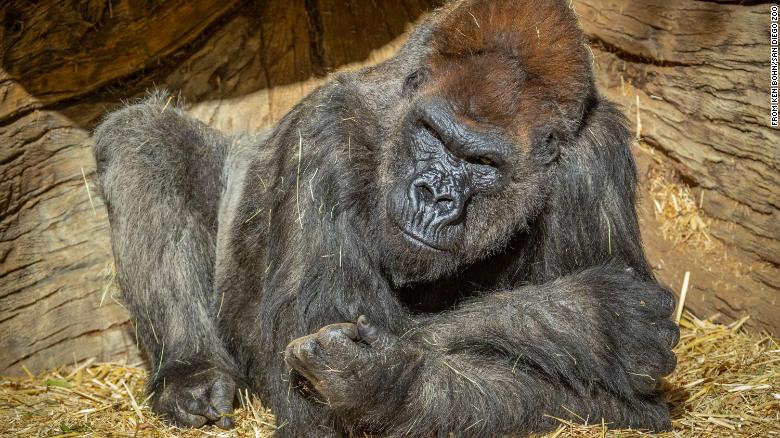Georgia Aquarium Otters Quarantined By COVID-19 0:58
(CNN) -
The Georgia Aquarium in Atlanta says its Asian small-clawed otters have tested positive for the virus that causes covid-19.
The aquarium announced Sunday that it tested the otters after they showed "mild respiratory symptoms, including sneezing, runny nose, mild lethargy and cough."
The seven animals are being cared for outside the exhibition facilities.
Despite being elderly, they are improving and are expected to make a full recovery, according to the aquarium.
They warn that hundreds of pets are being abandoned by covid-19
"Our Asian small-clawed otters are under the close watch of veterinarians and members of the animal care team," said Dr. Tonya Clauss, vice president of animal and environmental health at the Georgia Aquarium.
"We are providing supportive care as needed so that they can eat, rest and recover."
The aquarium suspects the otters were infected by an asymptomatic staff member and tested all staff who came in contact with them.
These animals have no direct contact with visitors and have always been separated from them by acrylic barriers, the aquarium said.
"Otters will continue to be monitored and, once they stop testing positive for COVID-19, it will be determined when they will be exhibited again," he added in a statement.
advertising
They investigate how some pets and animals in zoos were infected with covid-19 in New York
Other cases of covid-19 in animals
1 of 10
|
The Georgia Aquarium in Atlanta said its Asian small-clawed otters tested positive for COVID-19.
The aquarium suspects the otters were caught from an asymptomatic staff member.
2 of 10
|
In California, the San Diego Zoo reported in January that at least two of its gorillas had tested positive for COVID-19.
They are the first reported cases in great apes.
3 of 10
| A snow leopard tested positive for COVID-19 in December at the Louisville Zoo in the US It is likely that it was infected by contact with an asymptomatic staff member "despite the precautions taken by the zoo" animal health authorities said.
4 of 10
| Spanish authorities ordered nearly 100,000 minks to be euthanized after an outbreak on a farm, where the animals are raised to wear their fur, after several of them tested positive for the new coronavirus. Minks are added to the list of animals that have tested positive for covid-19, the disease that has infected more than 13 million in the world and has left more than half a million deaths. See in this gallery other animals that have tested positive for the virus and what we know about these infections.
5 of 10
|
Two cats in New York were reported to be infected with the new coronavirus on April 22, federal officials announced.
Both had mild respiratory symptoms.
They were the first pets in the U.S. to test positive, the Centers for Disease Control and Prevention said.
Archive image.
6 of 10
|
Tigers: also in April, the first case of a covid-19 positive tiger was reported.
It was about a tiger at the Bronx Zoo, New York.
Later, seven other big cats were infected, according to the Wildlife Conservation Society.
7 of 10
|
This pug named Winston may have been the first dog in the United States to test positive for coronavirus, according to researchers.
The dog was tested as part of the study involving his family, who had had the disease.
8 of 10
|
Ferrets can also get it.
One study found that ferrets were also "efficient" replicators of the virus, meaning the virus can easily grow and reproduce on their long, slippery bodies.
"SARS-CoV-2 can replicate in the upper respiratory tract of ferrets for up to eight days, without causing serious illness or death," the study said.
The study did not consider a longer time frame.
9 of 10
| Archive image. 2 dogs in Hong Kong and a cat in Belgium also tested positive in April, but the American Veterinary Medical Association gave a piece of reassurance on its website: "Infectious Disease Experts and Various International and National Human and Animal Health Organizations agree that there is no evidence at this time indicating that pets transmit COVID-19 to other animals, including people. "
10 of 10
|
Pets may not infect people with coronavirus, but pet owners should protect cats, dogs, and other companion animals, the U.S. Food and Drug Administration (FDA) warned. .
“Although it does not appear that animals can give you the virus, it seems that you can infect them.
So if you are sick, avoid direct contact with your pets.
If possible, have someone else take care of them until you are healthy again, ”says the FDA in a video.
This is the first time that the Georgia Aquarium has tested one of its animals for COVID-19, but it is not the first time that an animal has tested positive.
In December, three snow leopards tested positive for coronavirus at the Louisville Zoo.
Thousands of minks have died on fur farms in Utah and Wisconsin after a series of coronavirus outbreaks.
A small number of cats and dogs have also tested positive throughout the pandemic.
Animals









